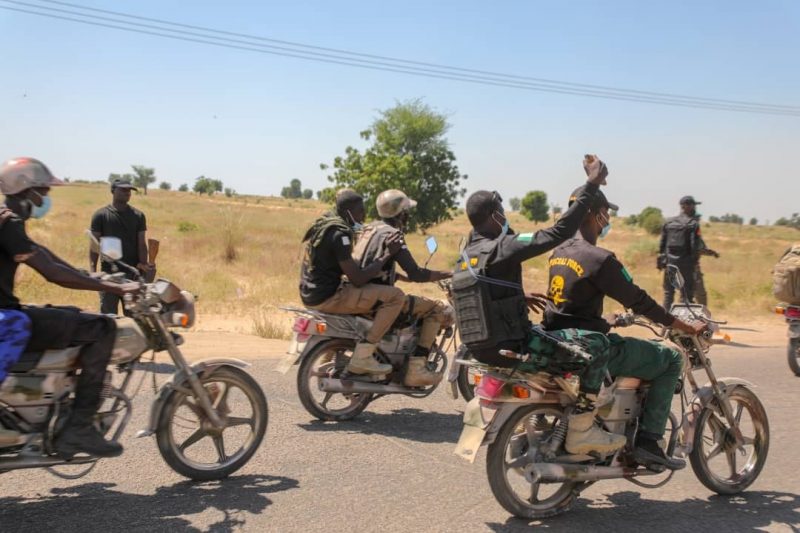Borno State government confirms that repentant insurgents are taking part in ongoing counterinsurgency operations in the Lake Chad region, fighting alongside Nigerian soldiers.
An undisclosed number of surrendered insurgents have switched sides and are taking part in ongoing counterinsurgency operations in the Lake Chad region, fighting alongside Nigerian soldiers and other security operatives.
The Borno State government made the disclosure on Monday, July 22, at a one-day workshop for journalists held at the NUJ [Nigeria Union of Journalists] Press Centre in Maiduguri, the capital of Nigeria’s northeastern Borno State.
The United Nations Children’s Fund (UNICEF) and the state’s Ministry of Reconstruction, Rehabilitation and Resettlement (MRRR) organised the workshop to examine the role of the media in the social reintegration of repentant insurgents and peacebuilding.
Modu Alhaji Massa, the permanent secretary of the Ministry of Information and Internal Security, who was representing the commissioner, Usman Tar, said the state government had received, processed and rehabilitated more than 160,000 fighters, families and associates of the Jamā’at Ahl as-Sunnah lid-Da’way Wa’l-Jihād (JAS), more commonly referred to as Boko Haram, and the Islamic State West Africa Province (ISWAP).
He said the government’s non-kinetic “Borno Model Concept” had led to the voluntary surrender of more than 5,000 JAS fighters to Nigerian troops from the Sambisa Forest, which is notorious for its numerous insurgent hideouts, the Mandara Mountain, a volcanic range along the northern part of the Cameroon-Nigeria border, and the Lake Chad region.
Of these, more than 2,500 “low-risk” members had been fully reintegrated into everyday society. The rest are “assisting the military” in fighting those who are still in the bush. Massa referred to them as “Special Forces” or “Hybrid Forces”.
Additionally, he said, more than 150,000 civilians had been rescued and rehabilitated.
It was the first public confirmation by the Borno State government that former JAS and ISWAP fighters are participating in counterinsurgency operations, joining forces with soldiers and other security operatives to put an end to what is often referred to as the “Boko Haram insurgency”.
The former fighters have also been seen in the main streets of Maiduguri, riding new motorbikes and armed with sophisticated rifles. Citizens are restricted from riding motorbikes in the city.
A resident of Maiduguri, Mohammed Abba, said there was nothing wrong in engaging the surrendered insurgents in counterinsurgency operations but he believed it was “too soon”.
“These people spent years fighting for Boko Haram. Now they have surrendered to the military and they are fighting for the government against their former allies.
“I think the government should have monitored these repentant fighters for years before taking this bold decision.”
Bakura Waziri, also a Maiduguri resident, told RNI that the decision was wrong because, in his opinion, the insurgents could “hardly be trusted”.
“To be honest, I am surprised by the decision. The government should have consulted with a wider audience before taking this drastic decision.
“These people fought against the system for years. If they believed in it, they would not have taken up arms against it in the first place. After years of violence against ordinary citizens, how do we know that they can be trusted?”
A Niger-based counterinsurgency expert, Amadou Inazoum, said there were ways in which the government could use the former fighters to get the best out of them without allowing them to fight in counterinsurgency operations.
“The surrendered insurgents have so much important information that can help the military and the intelligence agencies. They know where insurgents are hiding out; they know the extent to which they are armed; they know their movements. They have valuable inside intelligence and information.
“It must not be forgotten that these people were ordinary civilians not fighters. It was only after joining the insurgents that they became fighters.
“I think it would have been better for the government to disarm them once and for all and encourage them to start living as civilians again. These fighters surrendered. They should not be encouraged to take up arms again even if they have switched sides and are now fighting alongside government troops and other security operatives.”
SHETTIMA LAWAN MONGUNO









